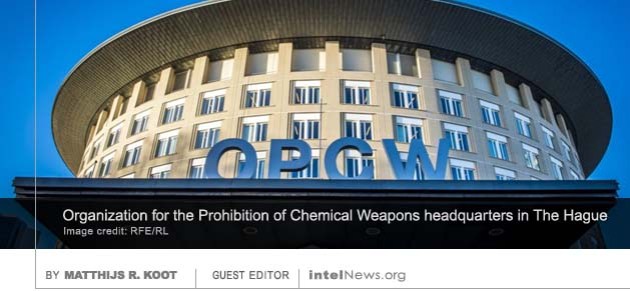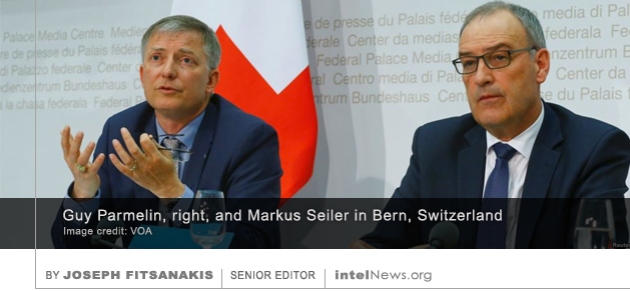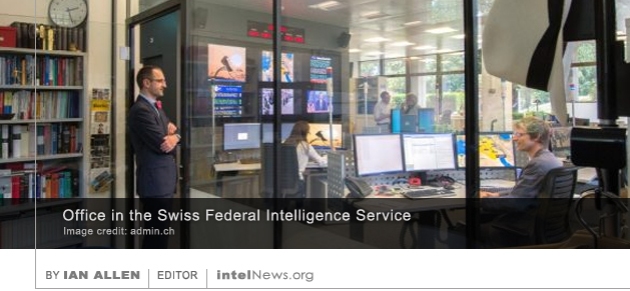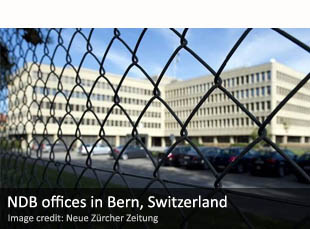Russian espionage reaching ‘intolerable levels’ say Swiss officials
October 23, 2018 1 Comment
 Russian espionage activities in Switzerland are increasing and are crossing long-established “red lines”, according to senior Swiss defense and intelligence officials who spoke at a news conference last week. The claims were made by Guy Parmelin, head of Switzerland’s Federal Department of Defense, and Jean-Philippe Gaudin, director of the Swiss Federal Intelligence Service (NDB). The two men spoke on Friday before reporters in Bern. Following the news conference, Gaudin spoke with reporters from the Reuters news agency.
Russian espionage activities in Switzerland are increasing and are crossing long-established “red lines”, according to senior Swiss defense and intelligence officials who spoke at a news conference last week. The claims were made by Guy Parmelin, head of Switzerland’s Federal Department of Defense, and Jean-Philippe Gaudin, director of the Swiss Federal Intelligence Service (NDB). The two men spoke on Friday before reporters in Bern. Following the news conference, Gaudin spoke with reporters from the Reuters news agency.
Gaudin, who assumed the post of NDB director three months ago, told Reuters that Russian espionage activities in Switzerland have been increasing steadily in recent years. He refused to provide details, but said that “it is clear we have more activities than before”. Additionally, Moscow had more active spies in Switzerland than in previous years, said Gaudin. He refused to provide numbers, saying that he would “share that with [his] colleagues elsewhere and not with the media”. The NDB chief noted that Switzerland had always been a target of Soviet and Russian espionage because it hosts the headquarters of a large number of international and non-governmental organizations. However, what is different today, he said, is that Moscow is targeting Switzerland’s “sensitive infrastructure”, which is “a red line”. He did not provide further information. Speaking alongside Gaudin, Defense Minister Parmelin said that Russian espionage activities against Swiss national infrastructure “has reached intolerable levels”.
These allegations by senior Swiss government officials come a little more than a month after reports that Swiss and other Western intelligence agencies thwarted a plot by two Russians who tried to hack the computer systems of a Swiss government laboratory that investigates nuclear, biological and chemical weapons. The laboratory, located in the western Swiss city of Spiez, had been commissioned by the Organization for the Prohibition of Chemical Weapons to carry out investigations related to the poisoning of Russian double agent //Sergei Skripal// and his daughter Yulia in March of this year. It has also carried out probes on the alleged use of chemical weapons by the Russian-backed government of President Bashar al-Assad in Syria.
The Russian embassy in Bern rejected the accusations of espionage and called the allegations made by Gaudin, and Parmelin “absurd”.
► Author: Joseph Fitsanakis | Date: 23 October 2018 | Permalink
 Western intelligence agencies thwarted a plot involving two Russians intending to travel to a Swiss government laboratory that investigates nuclear, biological and chemical weapons, and hack its computer systems. According to two separate reports by Dutch newspaper
Western intelligence agencies thwarted a plot involving two Russians intending to travel to a Swiss government laboratory that investigates nuclear, biological and chemical weapons, and hack its computer systems. According to two separate reports by Dutch newspaper  Germany has dropped a criminal case against the second-in-command of Switzerland’s intelligence agency, who was accused by Berlin of authorizing an espionage operation against the German tax collection service. A year ago, Germany launched an
Germany has dropped a criminal case against the second-in-command of Switzerland’s intelligence agency, who was accused by Berlin of authorizing an espionage operation against the German tax collection service. A year ago, Germany launched an  Germany has launched an unprecedented investigation into three officers of Switzerland’s intelligence agency on suspicion that they spied on German tax investigators who were probing the activities of Swiss banks. News of the investigation comes three months after authorities in Germany
Germany has launched an unprecedented investigation into three officers of Switzerland’s intelligence agency on suspicion that they spied on German tax investigators who were probing the activities of Swiss banks. News of the investigation comes three months after authorities in Germany  Senior Swiss government officials, including the defense minister and the director of the country’s intelligence agency, have defended Switzerland’s right to spy on European tax-fraud investigators who meddle in Swiss affairs. Earlier this week, German authorities
Senior Swiss government officials, including the defense minister and the director of the country’s intelligence agency, have defended Switzerland’s right to spy on European tax-fraud investigators who meddle in Swiss affairs. Earlier this week, German authorities  Authorities in Germany have announced the arrest of a Swiss national who was allegedly spying on the activities of German tax-fraud investigators in Frankfurt. According to prosecutors in the German state of Hesse, of which Frankfurt is the largest city, the Swiss man was arrested on Friday and is currently in custody. He has been identified only as Daniel M., and is believed to be in his mid-50s. According to news reports, German counterintelligence officers had been monitoring the suspect for over a year. They were issued a warrant for his arrest in December of last year, but waited until he was on German soil to arrest him. He was arrested at Frankfurt Airport.
Authorities in Germany have announced the arrest of a Swiss national who was allegedly spying on the activities of German tax-fraud investigators in Frankfurt. According to prosecutors in the German state of Hesse, of which Frankfurt is the largest city, the Swiss man was arrested on Friday and is currently in custody. He has been identified only as Daniel M., and is believed to be in his mid-50s. According to news reports, German counterintelligence officers had been monitoring the suspect for over a year. They were issued a warrant for his arrest in December of last year, but waited until he was on German soil to arrest him. He was arrested at Frankfurt Airport. Voters in Switzerland have strongly approved a proposed law that aims to expand the surveillance powers of Swiss intelligence agencies. The move is uncharacteristic of the Swiss, who have historically been skeptical of giving far-reaching surveillance powers to their government. In the late 1980s, Swiss public opinion was shocked by the revelation that the country’s Federal Military Department had spied without permission on tens of thousands of Swiss citizens for many decades under a top-secret project codenamed P-27. In response to the revelations, P-27 was ended, the Swiss intelligence agencies were reorganized, and stricter parliamentary controls were imposed on their activities. Today, even CCTV cameras are rarely used in Switzerland, while Google has not been given permission to incorporate the country’s streets into its Streetview application due to strict local privacy laws.
Voters in Switzerland have strongly approved a proposed law that aims to expand the surveillance powers of Swiss intelligence agencies. The move is uncharacteristic of the Swiss, who have historically been skeptical of giving far-reaching surveillance powers to their government. In the late 1980s, Swiss public opinion was shocked by the revelation that the country’s Federal Military Department had spied without permission on tens of thousands of Swiss citizens for many decades under a top-secret project codenamed P-27. In response to the revelations, P-27 was ended, the Swiss intelligence agencies were reorganized, and stricter parliamentary controls were imposed on their activities. Today, even CCTV cameras are rarely used in Switzerland, while Google has not been given permission to incorporate the country’s streets into its Streetview application due to strict local privacy laws.







An assessment of Russia’s espionage network in Switzerland
July 5, 2022 by Joseph Fitsanakis 4 Comments
“No-Questions-Asked” Approach to Espionage
Russia has been able to take advantage of Switzerland’s neutrality policy since February. Instead of returning to Moscow, at least some of the expelled Russian diplomats have been reposted to Switzerland. They continue to operate there under a “no-questions-asked” policy, which has prevailed since the days of the Cold War. For this and other reasons (i.e. proximity to prime intelligence targets, safety, advanced telecommunications systems), Switzerland has been a major intelligence hub for decades. According to the Nachrichtendienst des Bundes (NDB), Switzerland’s Federal Intelligence Service, the past few years have witnessed higher levels of activity by foreign intelligence services than any other period since the Cold War.
Russia’s Intelligence Presence in Switzerland
During that time, Russia has been able to build a pan-European espionage hub in the small alpine state. That is the conclusion of a report by Jonas Roth, which was published last week in the Neue Zürcher Zeitung (NZZ), Switzerland’s newspaper of record. The report, entitled “So Spioniert Russland in der Schweiz” (“How Russian spies operate in Switzerland”), features commentary by several experts and government officials. One source tells Roth that, despite the intense diplomatic pressure Russia has faced globally since February, its espionage structures in Swiss cities like Geneva and Bern “are still intact”.
How many Russian intelligence officers are currently operating in Switzerland? According to the report, at least a third of Russia’s 220-strong diplomatic presence in the country consists of intelligence officers. These 70 or so intelligence officers represent all three of Russia’s primary intelligence agencies, namely the Foreign Intelligence Service (SVR), the Main Directorate of the Armed Forces’ General Staff (GRU), and the Federal Security Service (FSB). Officers from these agencies handle an unknown number of informants and agents; these are Swiss or third-country nationals, who provide the Russians with intelligence on a regular basis. Special activities are carried out by Russian intelligence personnel who travel to Switzerland on an ad hoc basis. Read more of this post
Filed under Expert news and commentary on intelligence, espionage, spies and spying Tagged with Analysis, diplomacy, espionage, NDB (Switzerland), Newstex, Russia, Switzerland